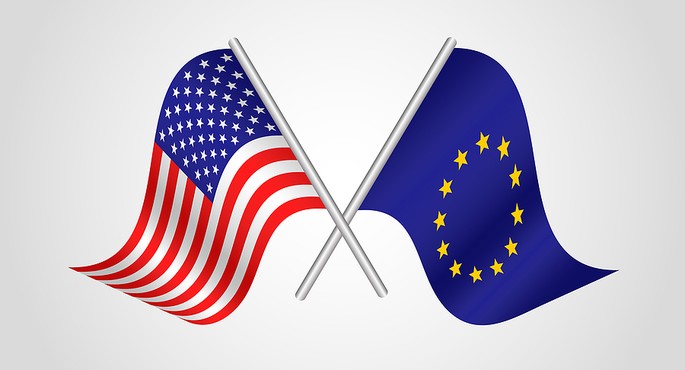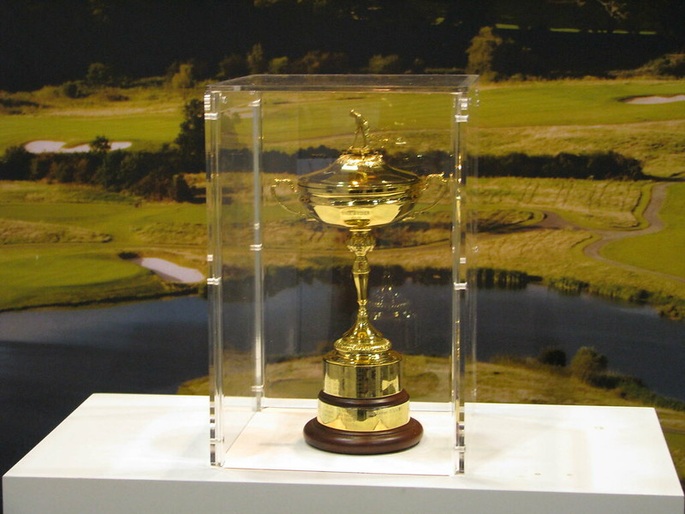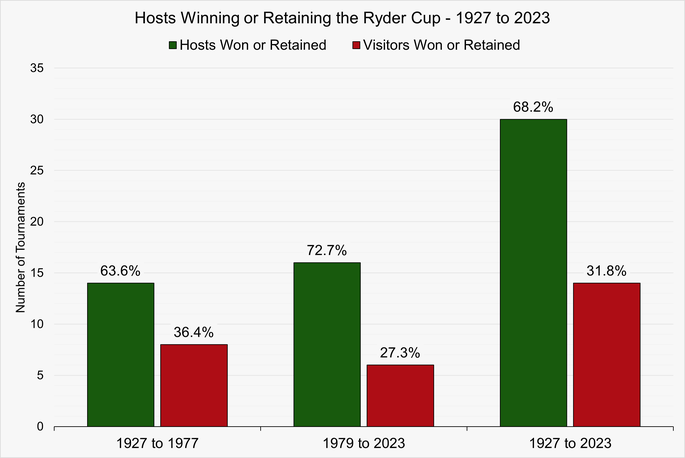 The world of professional golf is generally quite a solitary one. Yes, players head out onto the course in groups, but the others in your group are actively trying to beat you, so it doesn’t have an overly collegiate feel. Each player is able to chat to their caddy, but when they step up to take the shot it is just them and their own thoughts. It’s the lack of a team feeling to the vast majority of the game that makes the Ryder Cup so thrilling for all.
The world of professional golf is generally quite a solitary one. Yes, players head out onto the course in groups, but the others in your group are actively trying to beat you, so it doesn’t have an overly collegiate feel. Each player is able to chat to their caddy, but when they step up to take the shot it is just them and their own thoughts. It’s the lack of a team feeling to the vast majority of the game that makes the Ryder Cup so thrilling for all.
Yes, when the player steps up to his ball he is still on his own, but knowing that you’ve got the support of the rest of your team behind you can make all the difference. It is an incredibly exciting few days of golf and the crowd on the course can play its part. Whether the tournament is being hosted in the United States of America or Europe, the people that turn up to watch are the definition of biased, but how much difference do they make?
How Often Does the Ryder Cup Hosts Win?
In the modern USA versus Europe format of the Ryder Cup (1979 – present day), the host has won or retained the trophy 72.7% of the time. If we go back to the first Ryder Cup in 1927, the hosts have won or retained the Trophy 68.2% of the time.
The Ryder Cup Format Explained

The Ryder Cup is a biennial tournament that pits the best golfers from the United States of America up against the best from Europe. The host venue alternates from one team to the next each time the competition rolls around, with courses in the US and Europe chosen by the organising committee. The Ryder Cup was originally between the States and British players, taking place for the first time in 1927.
The tournament extended out to include players from continental Europe in 1979, largely because of the success of the likes of Antonio Garrido and Seve Ballesteros. Since the switch to include European players, the team from Europe has won the tournament twelve times and retained it thanks to a tie once, whilst the Americans have enjoyed nine wins, but we’ll come to look at that in more detail shortly.
Match Play

The Ryder Cup teams have twelve golfers on each side, from whom a captain picks the players to get involved in match play competitions. The tournament gets underway on a Friday and concludes on a Sunday, with twenty-eight matches played in total during that time. All of the matches are played over eighteen holes, with the following being the breakdown of the way the matches work:
- Friday: Four fourball matches & four foursome matches
- Saturday: Four fourball matches & four foursome matches
- Sunday: Twelve singles matches
The captain is responsible for picking any eight players to play on each session the Friday and any eight each session on the Saturday, without the requirement for all players in the team to take part in a match. This changes on the Sunday, however, when all twelve players head onto the course for singles matches. The captain assign the match of the day that they’d like their players to play in without knowing who they will be up against.
The winning team of each match, or the winning player in the singles matchups, wins a point for their team. If the match is tied after eighteen holes then both teams receive half a point. The destination of the Ryder Cup at the end of the three days of play is decided by the team that has the most points. In the event that both teams finish on fourteen points apiece, the trophy is retained by the team that held it before the tournament began.
How The Points Work

By Omar Rawlings, flickr
Foursome match play sees two golfers take alternate shots using the same ball, with the team that takes the least amount of shots over the course of the hole winning it. In fourball matchplay, meanwhile, all four golfers play their own ball and it is the better score of the two golfers that is put forward as the score for their team. The team with the lowest score on each hole wins said hole.
Because of the nature of match play, it is not necessary to play all eighteen holes. If one player or team has won more holes than there are left to play then they will win the overall point. Unlike in normal golf competitions, the cumulative total of shots taken by a player is irrelevant, only whether they have won more holes than their opposite number. A player is able to play a maximum of five matches over the course of the weekend.
How The Players Are Chosen

It has always been the responsibility of the captain to choose the composition of his team. The captains are always professional golfers and none have been both a player in the team and a captain since Arnold Palmer did so in 1963. The exact make-up of the team tends to be decided according to the recent performances of the players involved for the first six picks, with captains choosing six ‘wild cards’ to make up the rest of the team (in 2023)..
The European team and the American team use different metrics to decide which players will qualify to be on the teams. The number of wild card picks can also change, so it’s always worth checking out what rules each team is using if you’re wondering which golfers will be picked ahead of the competition getting underway. Regardless of the team makeup, the Ryder Cup is always an exciting spectacle.
How Often Do The Hosts Win?

By Dan Perry, flickr
At the time of writing, there have been forty-four editions of the Ryder Cup. If, however, you’re talking about the competition in its modern format then there have been twenty-two that featured a team from the United States of America going up against a team representing Europe. Here we’ll have a look at the breakdown of wins for the host team in both versions of the competition.
Great Britain (& Ireland) versus USA Results – 1927 to 1977
| Year | Host Course | Winners | Winning Host? |
|---|---|---|---|
| 1927 | Worcester Country Club, USA | USA | ✅ |
| 1929 | Moortown Golf Club, Great Britain | Great Britain | ✅ |
| 1931 | Scioto Country Club, USA | USA | ✅ |
| 1933 | Southport & Ainsdale Golf Club, Great Britain | Great Britain | ✅ |
| 1935 | Ridgewood Country Club, USA | USA | ✅ |
| 1937 | Southport & Ainsdale Golf Club, Great Britain | USA | ✖ |
| 1947 | Portland Golf Club, USA | USA | ✅ |
| 1949 | Ganton Golf Club, Great Britain | USA | ✖ |
| 1951 | Pinehurst Resort (No.2), USA | USA | ✅ |
| 1953 | Wentworth Club, Great Britain | USA | ✖ |
| 1955 | Thunderbird Country Club, USA | USA | ✅ |
| 1957 | Lindrick Golf Club, Great Britain | Great Britain | ✅ |
| 1959 | Eldorado Country Club, USA | USA | ✅ |
| 1961 | Royal Lytham & St. Annes, Great Britain | USA | ✖ |
| 1963 | Atlanta Athletic Club, USA | USA | ✅ |
| 1965 | Royal Birkdale Golf Club, Great Britain | USA | ✖ |
| 1967 | Champions Golf Club, USA | USA | ✅ |
| 1969 | Royal Birkdale Golf Club, Great Britain | Tied | Visitors Retained |
| 1971 | Old Warson Country Club, USA | USA | ✅ |
| 1973 | Muirfield, Great Britain | USA | ✖ |
| 1975 | Laurel Valley Golf Club, USA | USA | ✅ |
| 1977 | Royal Lytham & St Annes, Great Britain | USA | ✖ |
You can see, then, that the United States of America was the dominant force in the Ryder Cup prior to the move to involving players from continental Europe. Whilst for the first four tournaments victory went to the hosts, after that the Europeans were only able to gain one victory regardless of where the tournament was played. As a result, the hosts won fourteen out of a possible twenty-two times.
That means that the host nation won 63.6% of the Ryder Cups that were played between Great Britain and the United States of America. It’s worth noting that the name of the British team changed over time to acknowledge the fact that Irish players had always been on the team, becoming Great Britain and Ireland, but the fact remains that the Americans dominated and the hosts won over 63% of the time.
From 1979 onwards, the Ryder Cup has been competed between players from the United States of America and players from Europe. Here’s a look at the year that the tournament took place, which course it was played at and which team won:
Europe versus USA Results – 1979 to 2023
| Year | Host Course | Winners | Winning Host? |
|---|---|---|---|
| 1979 | The Greenbrier, West Virginia, USA | USA | ✅ |
| 1981 | Walton Heath Golf Club, England | USA | ✖ |
| 1983 | PGA National Golf Club, Florida, USA | USA | ✅ |
| 1985 | The Belfry, England | Europe | ✅ |
| 1987 | Muirfield Village, Ohio, USA | Europe | ✖ |
| 1989 | The Belfry, England | Tied | Host Retained |
| 1991 | Kiawah Island Golf Resort, South Carolina, USA | USA | ✅ |
| 1993 | The Belfry, England | USA | ✖ |
| 1995 | Oak Hill Country Club, New York, USA | Europe | ✖ |
| 1997 | Valderrama Golf Club, Spain | Europe | ✅ |
| 1999 | The Country Club (Brookline), Massachusetts, USA | USA | ✅ |
| 2002 | The Belfry, England | Europe | ✅ |
| 2004 | Oakland Hills Country Club, Michigan, USA | Europe | ✖ |
| 2006 | K Club, Ireland | Europe | ✅ |
| 2008 | Valhalla Golf Club, Kentucky, USA | USA | ✅ |
| 2010 | Celtic Manor Resort, Wales | Europe | ✅ |
| 2012 | Medinah Country Club (No. 3), Illinois, USA | Europe | ✖ |
| 2014 | Gleneagles Hotel, Scotland | Europe | ✅ |
| 2016 | Hazeltine National Golf Club, Minnesota, USA | USA | ✅ |
| 2018 | Le Golf National, France | Europe | ✅ |
| 2021 | Whistling Straits, Wisconsin, USA | USA | ✅ |
| 2023 | Marco Simone Golf Club, Rome, Italy | Europe | ✅ |
It’s fair to say that things have been far more evenly spread since the Ryder Cup adapted to involve golfers from Europe instead of just those from the United Kingdom and Ireland. In fact, fifteen of the twenty-two Ryder Cups have been won by the host side, with one of the tournaments ending up tied and therefore being retained by the hosting Europeans, which is essentially the same as a win for them.
Watch Your Bets
For betting purposes, be aware that you can either bet on the winner of the contest which includes the tie, or you can bet on who will lift the trophy which includes a team retaining the Ryder Cup as a result of a tie.
Does the Host Hold an Advantage?
The result of this is that 72.7% of the Ryder Cups that have been played since the new format was introduced have either been won or maintained by the host nation. Whilst that’s a slightly larger figure than the 63.6% of host wins in the old format, the two are close enough to mean that they tell pretty much the same story. Put them together and it’s 68.2% of Ryder Cups being won or retained by the hosts, or roughly two thirds of the time.

To put it another way, if you’re wondering whether to bet on the hosts or not, you would have won more often than not based on past tournaments. If you feel as though the two teams are quite evenly spread then it is probably worth putting money on the hosts winning it or at least retaining it. If one is particularly strong then there’s no reason not to bet on them, irrespective of which golf course and country/continent is playing host.
